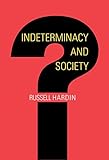Indeterminacy and Society / Russell Hardin.
Material type: TextPublisher: Princeton, NJ : Princeton University Press, [2013]Copyright date: ©2003Edition: Course BookDescription: 1 online resource (192 p.) : 4 line illusContent type:
TextPublisher: Princeton, NJ : Princeton University Press, [2013]Copyright date: ©2003Edition: Course BookDescription: 1 online resource (192 p.) : 4 line illusContent type: - 9780691123929
- 9781400848966
- 302 21
- HM1111 .H37 2003
- online - DeGruyter
- Issued also in print.
| Item type | Current library | Call number | URL | Status | Notes | Barcode | |
|---|---|---|---|---|---|---|---|
 eBook
eBook
|
Biblioteca "Angelicum" Pont. Univ. S.Tommaso d'Aquino Nuvola online | online - DeGruyter (Browse shelf(Opens below)) | Online access | Not for loan (Accesso limitato) | Accesso per gli utenti autorizzati / Access for authorized users | (dgr)9781400848966 |
Browsing Biblioteca "Angelicum" Pont. Univ. S.Tommaso d'Aquino shelves, Shelving location: Nuvola online Close shelf browser (Hides shelf browser)

|

|

|

|

|

|

|
||
| online - DeGruyter Power to the People : Energy in Europe over the Last Five Centuries / | online - DeGruyter Hamas and Civil Society in Gaza : Engaging the Islamist Social Sector / | online - DeGruyter Ancient Chinese Thought, Modern Chinese Power / | online - DeGruyter Indeterminacy and Society / | online - DeGruyter White Flight : Atlanta and the Making of Modern Conservatism / | online - DeGruyter Reflections on the Musical Mind : An Evolutionary Perspective / | online - DeGruyter Niccolò Machiavelli : An Intellectual Biography / |
Frontmatter -- CONTENTS -- PREFACE -- ACKNOWLEDGMENTS -- Chapter One. Indeterminacy -- Chapter Two. Beyond Basic Rationality -- Chapter Three. Mutual Advantage -- Chapter Four. The Greatest Sum -- Chapter Five. Marginal Determinacy -- Chapter Six. Rules for Determinacy -- Chapter Seven. Indeterminate Justice -- Chapter Eight. Mechanical Determinacy -- Appendix to Chapter Two: Determinacy in Iterated Prisoner's Dilemma -- Appendix to Chapter Four: Individually Cardinal Utility -- NOTES -- REFERENCES -- INDEX
restricted access online access with authorization star
http://purl.org/coar/access_right/c_16ec
In simple action theory, when people choose between courses of action, they know what the outcome will be. When an individual is making a choice "against nature," such as switching on a light, that assumption may hold true. But in strategic interaction outcomes, indeterminacy is pervasive and often intractable. Whether one is choosing for oneself or making a choice about a policy matter, it is usually possible only to make a guess about the outcome, one based on anticipating what other actors will do. In this book Russell Hardin asserts, in his characteristically clear and uncompromising prose, "Indeterminacy in contexts of strategic interaction . . . Is an issue that is constantly swept under the rug because it is often disruptive to pristine social theory. But the theory is fake: the indeterminacy is real." In the course of the book, Hardin thus outlines the various ways in which theorists from Hobbes to Rawls have gone wrong in denying or ignoring indeterminacy, and suggests how social theories would be enhanced--and how certain problems could be resolved effectively or successfully--if they assumed from the beginning that indeterminacy was the normal state of affairs, not the exception. Representing a bold challenge to widely held theoretical assumptions and habits of thought, Indeterminacy and Society will be debated across a range of fields including politics, law, philosophy, economics, and business management.
Issued also in print.
Mode of access: Internet via World Wide Web.
In English.
Description based on online resource; title from PDF title page (publisher's Web site, viewed 29. Jul 2021)


